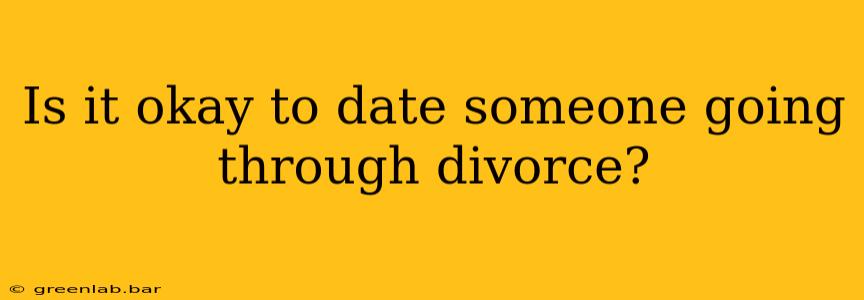Dating someone going through a divorce presents a unique set of challenges and considerations. It's a situation fraught with potential pitfalls, but also with the possibility of genuine connection. The question of whether it's "okay" is highly subjective and depends heavily on individual circumstances, maturity levels, and emotional intelligence. This article explores the complexities of dating someone in the midst of divorce, offering insights to help you navigate this delicate terrain.
Understanding the Emotional Landscape
Dating someone during a divorce is entering a relationship with someone emotionally vulnerable. They're likely grappling with a range of intense emotions: sadness, anger, confusion, and possibly even relief. Their emotional availability might be limited, and their focus may understandably be on their legal and personal disentanglement from their marriage. This doesn't necessarily mean they're unavailable for a relationship, but it does require a significant level of patience, understanding, and empathy.
Key Emotional Factors to Consider:
- Grief and Loss: Divorce involves a significant loss – the loss of a relationship, a shared life, and potentially a future envisioned together. Respect their grieving process and avoid minimizing their feelings.
- Legal and Financial Stress: Divorce proceedings can be lengthy, stressful, and financially draining. Be aware that their emotional state may be influenced by these external pressures.
- Guilt and Self-Doubt: Individuals going through divorce often question themselves and their choices, leading to feelings of guilt and self-doubt. Offer support, but avoid enabling unhealthy self-blame.
- Children Involved: If children are involved, the emotional complexities multiply. Their well-being will likely be a primary concern for your potential partner, influencing their availability and energy levels.
Practical Considerations Before Proceeding
Before embarking on a relationship with someone going through a divorce, it's essential to consider some crucial practical aspects:
1. The Divorce's Status:
- Legally Separated vs. Finalized: A significant difference exists between being legally separated and having a finalized divorce. A legally separated individual might still be bound by legal agreements that could complicate a new relationship. Clarify the legal standing of the divorce before proceeding.
2. Emotional Readiness:
- Are They Truly Ready?: Assess whether your potential partner is emotionally ready for a new relationship. Are they seeking a rebound, or are they genuinely seeking a connection? Honest communication is key.
3. Communication and Boundaries:
- Open and Honest Dialogue: Maintain open and honest communication about expectations, boundaries, and emotional needs from the outset. Establish clear boundaries that protect both of you.
4. The Ex-Spouse Factor:
- Potential for Conflict: Be prepared for the possibility of encountering the ex-spouse, either directly or indirectly. Maintain respectful distance and avoid getting involved in their conflicts.
Navigating the Relationship Successfully
If you choose to pursue a relationship with someone going through a divorce, consider these strategies for success:
- Patience and Understanding: Be patient and understanding of their emotional journey. It’s not a race; it's a process.
- Supportive, Not Enabling: Offer support, but avoid enabling unhealthy behaviors or delaying their healing process.
- Respect Their Boundaries: Respect their need for space, time, and focus on their personal matters.
- Focus on the Present: While acknowledging the past, focus on building a healthy present relationship.
- Seek Professional Advice: If navigating the complexities proves challenging, consider seeking guidance from a relationship counselor or therapist.
Conclusion: A Matter of Context
Dating someone going through a divorce isn't inherently "wrong" or "right." It's a highly nuanced situation demanding careful consideration and genuine empathy. By understanding the emotional landscape, addressing practical considerations, and fostering open communication, you can navigate this challenging territory with greater awareness and increase the chances of a healthy and fulfilling relationship, should that be the outcome. The key is mindful awareness and responsible engagement, respecting the emotional journey of all involved.

